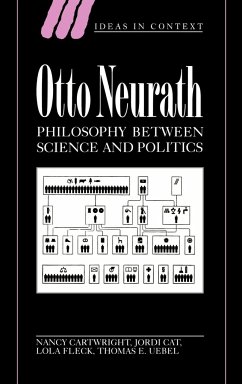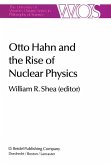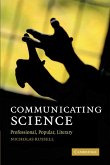Lola Fleck, Nancy CartwrightPhilosophy Between Science and Politics
Otto Neurath
Philosophy Between Science and Politics
Herausgeber: Skinner, Quentin
Lola Fleck, Nancy CartwrightPhilosophy Between Science and Politics
Otto Neurath
Philosophy Between Science and Politics
Herausgeber: Skinner, Quentin
- Gebundenes Buch
- Merkliste
- Auf die Merkliste
- Bewerten Bewerten
- Teilen
- Produkt teilen
- Produkterinnerung
- Produkterinnerung
A study of Neurath's theory of science in its economic, political and social contexts.
Andere Kunden interessierten sich auch für
![Otto Hahn and the Rise of Nuclear Physics Otto Hahn and the Rise of Nuclear Physics]() Otto Hahn and the Rise of Nuclear Physics121,99 €
Otto Hahn and the Rise of Nuclear Physics121,99 €![Kurt Otto Friedrichs Kurt Otto Friedrichs]() Kurt Otto Friedrichs121,99 €
Kurt Otto Friedrichs121,99 €![Kurt Otto Friedrichs Kurt Otto Friedrichs]() Kurt Otto Friedrichs242,99 €
Kurt Otto Friedrichs242,99 €![Kurt Otto Friedrichs Kurt Otto Friedrichs]() Kurt Otto Friedrichs161,99 €
Kurt Otto Friedrichs161,99 €![Kurt Otto Friedrichs Kurt Otto Friedrichs]() Kurt Otto Friedrichs121,99 €
Kurt Otto Friedrichs121,99 €![The Cambridge Companion to the Philosophy of Biology The Cambridge Companion to the Philosophy of Biology]() David L. Hull / Michael Ruse (eds.)The Cambridge Companion to the Philosophy of Biology45,99 €
David L. Hull / Michael Ruse (eds.)The Cambridge Companion to the Philosophy of Biology45,99 €![Communicating Science Communicating Science]() Nicholas RussellCommunicating Science54,99 €
Nicholas RussellCommunicating Science54,99 €-
-
-
A study of Neurath's theory of science in its economic, political and social contexts.
Hinweis: Dieser Artikel kann nur an eine deutsche Lieferadresse ausgeliefert werden.
Hinweis: Dieser Artikel kann nur an eine deutsche Lieferadresse ausgeliefert werden.
Produktdetails
- Produktdetails
- Verlag: Cambridge University Press
- Seitenzahl: 308
- Erscheinungstermin: 24. September 2003
- Englisch
- Abmessung: 235mm x 157mm x 23mm
- Gewicht: 653g
- ISBN-13: 9780521451741
- ISBN-10: 0521451744
- Artikelnr.: 21721310
- Herstellerkennzeichnung
- Libri GmbH
- Europaallee 1
- 36244 Bad Hersfeld
- gpsr@libri.de
- Verlag: Cambridge University Press
- Seitenzahl: 308
- Erscheinungstermin: 24. September 2003
- Englisch
- Abmessung: 235mm x 157mm x 23mm
- Gewicht: 653g
- ISBN-13: 9780521451741
- ISBN-10: 0521451744
- Artikelnr.: 21721310
- Herstellerkennzeichnung
- Libri GmbH
- Europaallee 1
- 36244 Bad Hersfeld
- gpsr@libri.de
Introduction
Part I. A Life Between Science and Politics: 1. Before Munich
1.1. Early years
1.2. War economics
1.3. During the First World War
2. The socialisation debate
2.1. Setting the problem
2.2. Bauer and Korsch
2.3. The standard of living
2.4. Neurath on the structure of the socialist economy
2.5. The road to socialisation
2.6. Neurath's position in the debate
3. In the Bavarian revolution
3.1. The appointment
3.2. In office
3.3. On trial
4. In Red Vienna
4.1. People's education
4.2. The Housing Movement
4.3. The Museum of Economy and Society
4.4. The Vienna Circle
4.5. Exile in The Hague and Oxford
Part II. On Neurath's Boat: 1. The Boat: Neurath's image of knowledge
2. In the First Vienna Circle
2.1. Three hypotheses
2.2. Mach's legacy
2.3. The 1910 programme
3. From the Duhem Thesis to the Neurath Principle
3.1. Normative antifoundationalism 3.2. Radical descriptive antifoundationalism
3.3. Metatheoretical antifoundationalism
4
Rationality without foundations
4.1
The primacy of practical reason
4.2. Determining the conventions of science
4.3. The second Boat: one world
5. A theory of scientific discourse
5.1. Anti-philosophy, Marxism and radical physicalism
5.2. The forward defense of naturalism
5.3. Science as discourse: the theory of protocols
6. Towards a theory of practice
Part III. Unity on the Earthly Plane: 1. Two stories with a common theme
2. Science: the stock of instruments
2.1. From re-represention to action
2.2. Unity without the pyramid
3. The attack on method
3.1. Boats and Ballungen
3.2. Protocols, precision and atomicity
3.3. The two Neurath Principles
4
Where Ballungen come from
4.1. Duhem's symbols
4.2. The congestion of events
4.3. The density of concepts
4.4. The separability of planning and politics
4.5. How Marxists think of history
5. Negotiation, not regulation
Conclusion.
Part I. A Life Between Science and Politics: 1. Before Munich
1.1. Early years
1.2. War economics
1.3. During the First World War
2. The socialisation debate
2.1. Setting the problem
2.2. Bauer and Korsch
2.3. The standard of living
2.4. Neurath on the structure of the socialist economy
2.5. The road to socialisation
2.6. Neurath's position in the debate
3. In the Bavarian revolution
3.1. The appointment
3.2. In office
3.3. On trial
4. In Red Vienna
4.1. People's education
4.2. The Housing Movement
4.3. The Museum of Economy and Society
4.4. The Vienna Circle
4.5. Exile in The Hague and Oxford
Part II. On Neurath's Boat: 1. The Boat: Neurath's image of knowledge
2. In the First Vienna Circle
2.1. Three hypotheses
2.2. Mach's legacy
2.3. The 1910 programme
3. From the Duhem Thesis to the Neurath Principle
3.1. Normative antifoundationalism 3.2. Radical descriptive antifoundationalism
3.3. Metatheoretical antifoundationalism
4
Rationality without foundations
4.1
The primacy of practical reason
4.2. Determining the conventions of science
4.3. The second Boat: one world
5. A theory of scientific discourse
5.1. Anti-philosophy, Marxism and radical physicalism
5.2. The forward defense of naturalism
5.3. Science as discourse: the theory of protocols
6. Towards a theory of practice
Part III. Unity on the Earthly Plane: 1. Two stories with a common theme
2. Science: the stock of instruments
2.1. From re-represention to action
2.2. Unity without the pyramid
3. The attack on method
3.1. Boats and Ballungen
3.2. Protocols, precision and atomicity
3.3. The two Neurath Principles
4
Where Ballungen come from
4.1. Duhem's symbols
4.2. The congestion of events
4.3. The density of concepts
4.4. The separability of planning and politics
4.5. How Marxists think of history
5. Negotiation, not regulation
Conclusion.
Introduction
Part I. A Life Between Science and Politics: 1. Before Munich
1.1. Early years
1.2. War economics
1.3. During the First World War
2. The socialisation debate
2.1. Setting the problem
2.2. Bauer and Korsch
2.3. The standard of living
2.4. Neurath on the structure of the socialist economy
2.5. The road to socialisation
2.6. Neurath's position in the debate
3. In the Bavarian revolution
3.1. The appointment
3.2. In office
3.3. On trial
4. In Red Vienna
4.1. People's education
4.2. The Housing Movement
4.3. The Museum of Economy and Society
4.4. The Vienna Circle
4.5. Exile in The Hague and Oxford
Part II. On Neurath's Boat: 1. The Boat: Neurath's image of knowledge
2. In the First Vienna Circle
2.1. Three hypotheses
2.2. Mach's legacy
2.3. The 1910 programme
3. From the Duhem Thesis to the Neurath Principle
3.1. Normative antifoundationalism 3.2. Radical descriptive antifoundationalism
3.3. Metatheoretical antifoundationalism
4
Rationality without foundations
4.1
The primacy of practical reason
4.2. Determining the conventions of science
4.3. The second Boat: one world
5. A theory of scientific discourse
5.1. Anti-philosophy, Marxism and radical physicalism
5.2. The forward defense of naturalism
5.3. Science as discourse: the theory of protocols
6. Towards a theory of practice
Part III. Unity on the Earthly Plane: 1. Two stories with a common theme
2. Science: the stock of instruments
2.1. From re-represention to action
2.2. Unity without the pyramid
3. The attack on method
3.1. Boats and Ballungen
3.2. Protocols, precision and atomicity
3.3. The two Neurath Principles
4
Where Ballungen come from
4.1. Duhem's symbols
4.2. The congestion of events
4.3. The density of concepts
4.4. The separability of planning and politics
4.5. How Marxists think of history
5. Negotiation, not regulation
Conclusion.
Part I. A Life Between Science and Politics: 1. Before Munich
1.1. Early years
1.2. War economics
1.3. During the First World War
2. The socialisation debate
2.1. Setting the problem
2.2. Bauer and Korsch
2.3. The standard of living
2.4. Neurath on the structure of the socialist economy
2.5. The road to socialisation
2.6. Neurath's position in the debate
3. In the Bavarian revolution
3.1. The appointment
3.2. In office
3.3. On trial
4. In Red Vienna
4.1. People's education
4.2. The Housing Movement
4.3. The Museum of Economy and Society
4.4. The Vienna Circle
4.5. Exile in The Hague and Oxford
Part II. On Neurath's Boat: 1. The Boat: Neurath's image of knowledge
2. In the First Vienna Circle
2.1. Three hypotheses
2.2. Mach's legacy
2.3. The 1910 programme
3. From the Duhem Thesis to the Neurath Principle
3.1. Normative antifoundationalism 3.2. Radical descriptive antifoundationalism
3.3. Metatheoretical antifoundationalism
4
Rationality without foundations
4.1
The primacy of practical reason
4.2. Determining the conventions of science
4.3. The second Boat: one world
5. A theory of scientific discourse
5.1. Anti-philosophy, Marxism and radical physicalism
5.2. The forward defense of naturalism
5.3. Science as discourse: the theory of protocols
6. Towards a theory of practice
Part III. Unity on the Earthly Plane: 1. Two stories with a common theme
2. Science: the stock of instruments
2.1. From re-represention to action
2.2. Unity without the pyramid
3. The attack on method
3.1. Boats and Ballungen
3.2. Protocols, precision and atomicity
3.3. The two Neurath Principles
4
Where Ballungen come from
4.1. Duhem's symbols
4.2. The congestion of events
4.3. The density of concepts
4.4. The separability of planning and politics
4.5. How Marxists think of history
5. Negotiation, not regulation
Conclusion.








